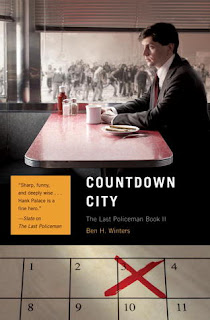 I'm now two books into this trilogy about a policeman/private detective (sort of) in the months leading up to the end of the world by asteroid collision. I quite enjoyed the first one, but I think I like Countdown City even more. The world is now well established, and Winters is going some interesting places with a fairly traditional mystery as the vehicle.
I'm now two books into this trilogy about a policeman/private detective (sort of) in the months leading up to the end of the world by asteroid collision. I quite enjoyed the first one, but I think I like Countdown City even more. The world is now well established, and Winters is going some interesting places with a fairly traditional mystery as the vehicle.There's more going on, though, under the surface, about family, about routine, about chaos and hope and despair, and there's a little part of me that says that it's the third book that's going to tell the tale. With something like this, you wonder if there's going to be a miraculous way out at the end of the third book, and I don't mean to be morbid when I say, from the perspective of the end of the second book, that's it's going to be a shame if the world doesn't end.
Let me see if I can pull apart why that is.
In this book, the main character, Hank Palace, is off the force and just trying to live out his remaining days in relative peace before the asteroid arrives. Everyone knows now that it's supposed to hit on the other side of the planet, killing most people there quickly, and on this side, slowly, through a long dust winter and famine. Many people have run off to seize some moments of joy before the end. Some are violent. Some are just there, barely. Some have committed suicide.
A woman who babysat Hank and his sister Niko as children comes to him, asking for help finding her husband, who disappeared a few days before. She is adamant that he's a fine, upstanding man who would never have just left her, and surprisingly, when Hank starts to investigate, everyone he talks to more or less agrees. And yet, he is gone, with no obvious sign of foul play.
Hank follows the trail to a campus that has been taken over by the students, then off into the wilds to track Brent, the missing husband. It's part police work, part exploration of the ways in which people deal with impending doom. And I think it's perceptive about it - if one person is facing mortality, they're still in a world that will continue to go on, but when the whole world is about to end, even if some people survive initially, everything is irrevocably changed.
Hank, obviously, wants there to continue to be some structure or order. The students at the college want to try out their most utopian concepts, which sort of works and sort of doesn't and occasionally falls apart in a big haze of weed. Many people walk away from their lives. Some turn violent. And then, as shortages start to happen, things get uglier.
But not universally uglier, and this is an important point. When we look at pre- or post-apocalyptic novels (I'll admit the former is a smaller genre), we look at how authors think humans would respond to the world coming to an end or having ended. I get frustrated when it's unrelentingly grim - it becomes a pessimism about human nature that's so deep that I don't know how to deal with it. It can become an idea that we are, fundamentally, always awful. And while we are definitely sometimes awful, we are also sometimes kind and generous, and showing one without the other shapes our cultural conversation about who we are, and what we owe to each other.
When we find out why Brent left, another piece falls into place, and I'm certainly not going to spoil it, but yes, some people would react like this, under pressure. With a world falling apart, this is one of the reactions there would be.
The mystery part of it is well done, for what it is, but the meat of this book is a world that is getting ever closer to collapse. Hank's sister is convinced this is all a government conspiracy, that the asteroid could be easily diverted if they can just do x, y, and z. I presume we'll find out in the next book, but I think it would be a letdown if there was a deus ex machina. But on the other hand, I've grown awfully fond of these doomed characters.
No comments:
Post a Comment